新概念英语2_Lesson1_知识点讲解
- 格式:doc
- 大小:52.00 KB
- 文档页数:5
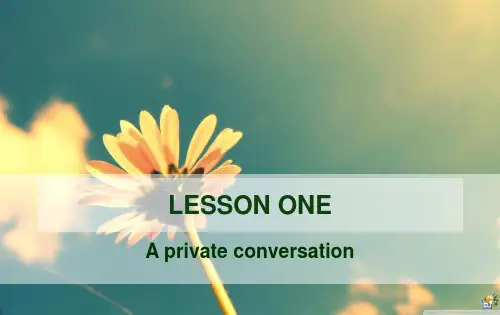
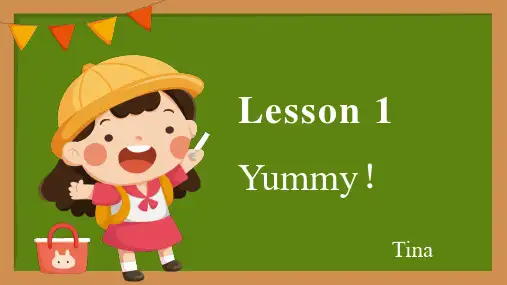
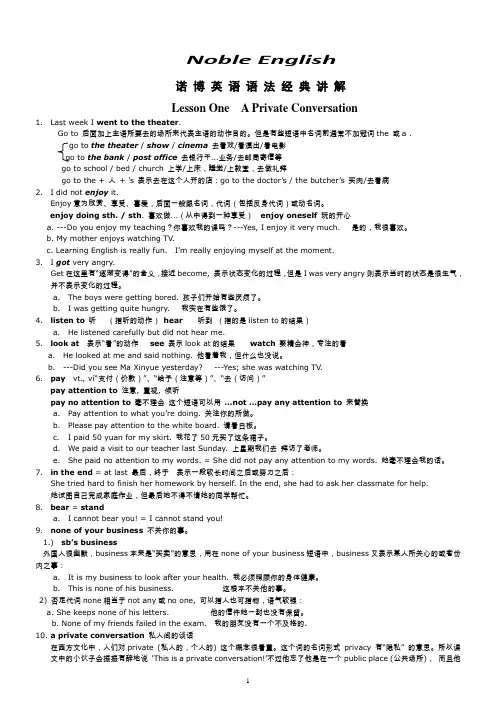
N oble English诺博英语语法经典讲解Lesson One A Private Conversationst week I went to the theater.Go to 后面加上主语所要去的场所来代表主语的动作目的。
但是有些短语中名词前通常不加冠词the 或a .go to the theater / show / cinema 去看戏/看演出/看电影go to the bank / post office 去银行干…业务/去邮局寄信等go to school / bed / church 上学/上床,睡觉/上教堂,去做礼拜go to the + 人+ ‟s表示去在这个人开的店:go to the doctor‟s / the butcher‟s 买肉/去看病2.I did not enjoy it.Enjoy意为欣赏、享受、喜爱,后面一般跟名词,代词(包括反身代词)或动名词。
enjoy doing sth. / sth. 喜欢做…(从中得到一种享受)enjoy oneself玩的开心a. ---Do you enjoy my teaching?你喜欢我的课吗?---Yes, I enjoy it very much. 是的,我很喜欢。
b. My mother enjoys watching TV.c. Learning English is really fun. I‟m really enjoying myself at the moment.3.I got very angry.Get在这里有“逐渐变得”的含义,接近become, 表示状态变化的过程,但是I was very angry则表示当时的状态是很生气,并不表示变化的过程。
a.The boys were getting bored. 孩子们开始有些厌烦了。
b.I was getting quite hungry. 我实在有些饿了。
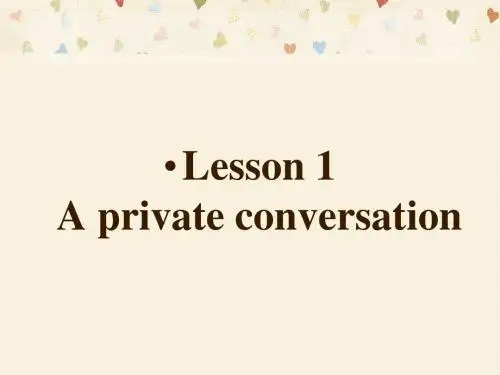
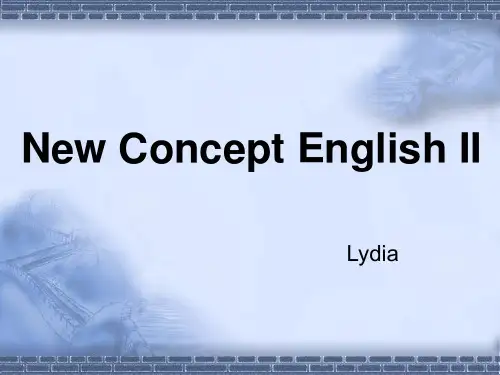
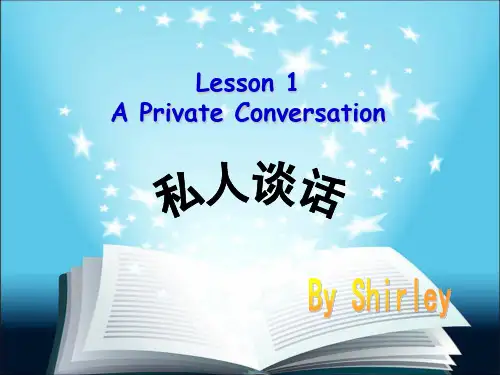
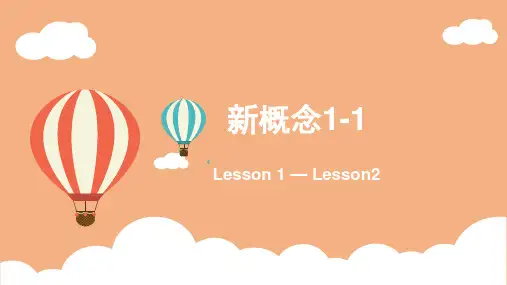
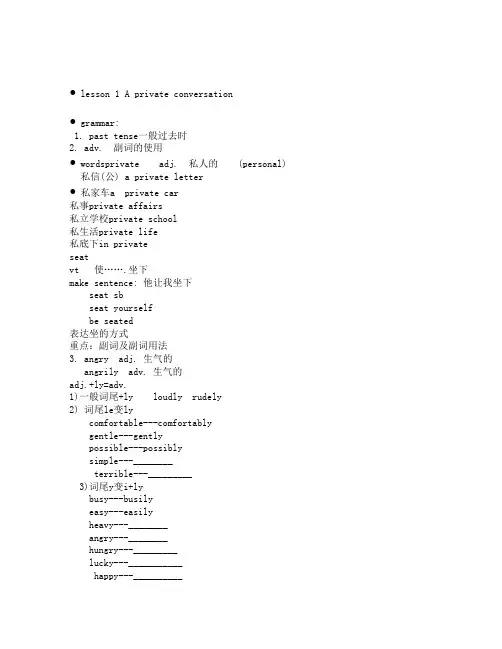
•lesson 1 A private conversation •grammar:1. past tense一般过去时2. adv. 副词的使用•wordsprivate adj. 私人的 (personal) 私信(公) a private letter•私家车a private car私事private affairs私立学校private school私生活private life私底下in privateseatvt 使…….坐下make sentence: 他让我坐下seat sbseat yourselfbe seated表达坐的方式重点:副词及副词用法3. angry adj. 生气的angrily adv. 生气的adj.+ly=adv.1)一般词尾+ly loudly rudely2) 词尾le变lycomfortable---comfortablygentle---gentlypossible---possiblysimple---________terrible---_________3)词尾y变i+lybusy---busilyeasy---easilyheavy---________angry---________hungry---_________lucky---___________happy---__________•他开心地去瑞安了。
•He went to Rui’an happily.•make sentence•angrily/rudely/hungrily/luckly/busily/stupidly/sadly Attention n. 注意稍加注意 ___________________________多加注意 ___________________________更多注意___________________________不注意___________________________You must pay attention _____ that girl.Attention passengers, the plane is leaving.汉译:______________________bear (bore, born)练习1. I left.I could not put up_____ him2.I can't ________忍受 you. You are so rude. Business n. 事, 生意business man :生意人do business: 做生意on business 出差It's none of your business. 不关你的事。
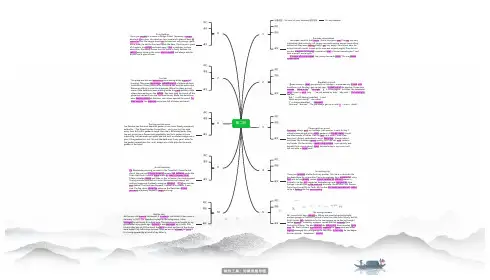
第二册1必备句型:It's none of your business.与你无关It's my business.词汇语法课文A private conversationLast week I went to the theater.I had a very good seat.The play was very interesting.I did not enjoy it.A young man and a young woman were sitting behind me.They were talking loudly.I got very angry.I counld not hear the actors.I turned round.I looked at the man and woman angrily.They did not pay any attention.In the end,I counld not bear it.I turned round again.'I can't hear a word!'I said angrily.'It's none of your business.'the young man said rudely.'This is a private conversation'2词汇语法课文Breakfast or lunchIt was Sunday. I never get up early on Sundays. I sometimes stay in bed until lunchtime. Last Sunday I got up very late. I looked out of the window. It was dark outside. ‘What a day!’ I thought. ‘It’s raining again.' Just then, the telephone rang. It was my aunt Lucy. ‘ I've just arrived by train,’ she said. ‘ I'm coming to see you.’‘But I’m still having breakfast,’ I said.‘What are you doing?’ she asked. ‘I’m having breakfast,’ I repeated. ‘Dear me!’she said. ‘Do you always get up so late? It ’s one o’clock!’3词汇语法课文Please send me a cardPostcards always spoil my holidays. Last summer, I went to Italy. I visited museums and sat in public gardens. A friendly waiter taught me a few words of Italian. Then he lent me a book. I read a few lines, but I did not understand a word. Every day I thought about postcards. My holidays passed quickly, but I did not send cards to my friends. On the last day I made a big decision. I got up early and bought thirty-seven cards. I spent the whole day in my room, but I did not write a single card!4词汇语法课文An exciting tripI have just received a letter from my brother, Tim. He is in Australia. He has been there for six months. Tim is an engineer. He is working for a big firm and he has already visited a great number of different places in Australia. He has just bought an Australian car and has gone to Alice Springs, a small town in the centre of Australia. He will soon visit Darwin.From there, he will fly to Perth. My brother has never been abroad before,so he is finding this trip very exciting.5词汇语法课文No wrong numbersMr. James Scott has a garage in Silbury and now he has just boughtanother garage in Pinhurst. Pinhurst is only five miles from Silbury, but Mr.Scott cannot get a telephone for his new garage, so he has just bought twelve pigeons. Yesterday, a pigeon carried the first message fromPinhurst to Silbury. The bird covered the distance in three minutes. Up to now, Mr. Scott has sent a great many requests for spare parts and other urgent messages from one garage to the other. In this way, he has begun his own private ‘telephone’ service.6词汇语法课文Prrcy ButtonsI have just moved to a house in Bridge Street. Yesterday a beggar knocked at my door. He asked me for a meal and a glass of beer. In return for this, the beggar stood on his head and sang songs. I gave him a meal. He ate the food and drank the beer. Then he put a piece of cheese in his pocket and went away. Later a neighbor told me about him. Everybody knows him. His name is Percy Buttons. He calls at every house in the street once a month and always asks for a meal and a glass of beer.7词汇语法课文Too lateThe plane was late and detectives were waiting at the airport allmorning. They were expecting a valuable parcel of diamonds fromSouth Africa. A few hours earlier, someone had told the police thatthieves would try to steal the diamonds. When the plane arrived, some of the detectives were waiting inside the main building while others were waiting on the airfield. Two men took the parcel off theplane and carried it into the Customs House. While two detectiveswere keeping guard at the door, two others opened the parcel. To their surprise, the precious parcel was full of stones and sand!8词汇语法课文The best and the worstJoe Sanders has the most beautiful garden in our town. Nearly everybody enters for ‘The Nicest Garden Competition’ each year, but Joe wins every time. Bill Frith's garden is larger than Joe's. Bill works harder than Joe and grows more flowers and vegetables, but Joe's garden is moreinteresting. He has made neat paths and has built a wooden bridge over a pool. I like gardens too, but I do not like hard work. Every year I enter for the garden competition too, and I always win a little prize for the worst garden in the town!9词汇语法课文A cold welcomeOn Wednesday evening, we went to the Town Hall. It was the lastday of the year and a large crowd of people had gathered under the Town Hall clock. It would strike twelve in twenty minutes' time. Fifteen minutes passed and then, at five to twelve, the clock stopped.The big minute hand did not move. We waited and waited, butnothing happened. Suddenly someone shouted, ‘It’s two minutespast twelve! The clock has stopped!' I looked at my watch. It was true. The big clock refused to welcome the New Year. At that moment, everybody began to laugh and sing.10词汇语法课文Not for jazzWe have an old musical instrument. It is called a clavichord. It was made in Germany in 1681. Our clavichord is kept in the living-room. It hasbelonged to our family for a long time. The instrument was bought by my grandfather many years ago. Recently it was damaged by a visitor. She tried to play jazz on it! She struck the keys too hard and two of the strings were broken. My father was shocked. Now we are not allowed to touch it.It is being repaired by a friend of my father's.。
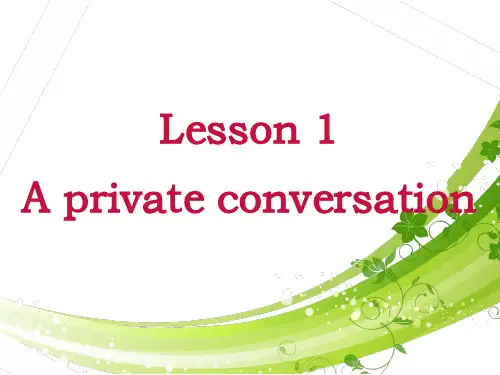
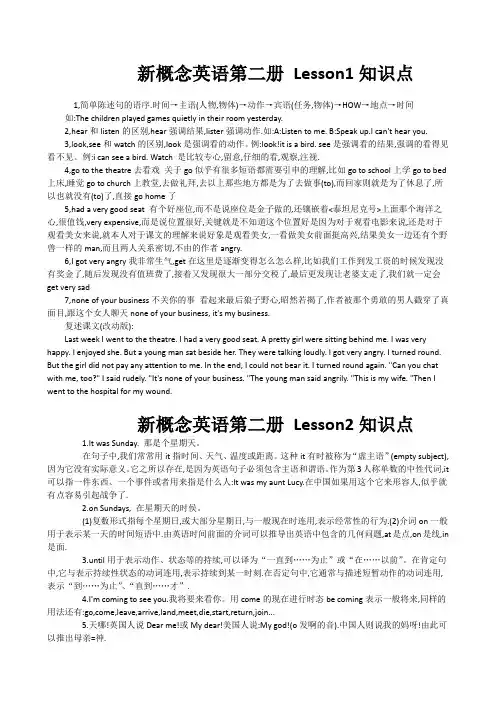
新概念英语第二册Lesson1知识点1,简单陈述句的语序.时间→主语(人物,物体)→动作→宾语(任务,物体)→HOW→地点→时间如:The children played games quietly in their room yesterday.2,hear和listen的区别,hear强调结果,lister强调动作.如:A:Listen to me. B:Speakup.I can't hear you.3,look,see和watch的区别,look是强调看的动作。
例:look!it is a bird. see是强调看的结果,强调的看得见看不见。
例:i can see a bird. Watch 是比较专心,留意,仔细的看,观察,注视.4,go to the theatre去看戏关于go似乎有很多短语都需要引申的理解,比如go to school上学go to bed 上床,睡觉go to church上教堂,去做礼拜,去以上那些地方都是为了去做事(to),而回家则就是为了休息了,所以也就没有(to)了,直接go home了5,had a very good seat 有个好座位,而不是说座位是金子做的,还镶嵌着<泰坦尼克号>上面那个海洋之心,很值钱,very expensive,而是说位置很好,关键就是不知道这个位置好是因为对于观看电影来说,还是对于观看美女来说,就本人对于课文的理解来说好象是观看美女,一看做美女前面挺高兴,结果美女一边还有个野兽一样的man,而且两人关系密切,不由的作者angry.6,I got very angry我非常生气,get在这里是逐渐变得怎么怎么样,比如我们工作到发工资的时候发现没有奖金了,随后发现没有值班费了,接着又发现很大一部分交税了,最后更发现让老婆支走了,我们就一定会get very sad7,none of your business不关你的事看起来最后狼子野心,昭然若揭了,作者被那个勇敢的男人戳穿了真面目,跟这个女人聊天none of your business,it's my business.复述课文(改动版):Last week I went to the theatre.I had a very good seat.A pretty girl were sitting behind me.I was very happy.I enjoyed she.But a young man sat beside her.They were talking loudly.I got very angry.I turned round.But the girl did not pay any attention to me.In the end,I could not bear it.I turned round again."Can you chat with me,too?"I said rudely."It's none of your business."The young man said angrily."This is my wife."Then I went to the hospital for my wound.新概念英语第二册Lesson2知识点1.It was Sunday. 那是个星期天。
New concept English 2 Lesson 1 A private conversation 私人谈话
一、课文重点词汇: private adj. 私人的 conversation n. 谈话 theatre n. 剧场,戏院 seat n. 座位 play n. 戏 loudly adv. 大声地 angry adj. 生气的 angrily adv. 生气地 attention n. 注意 bear v. 容忍 business n. 事 rudely adv. 无礼地,粗鲁地 Last week I went to the theatre. I had a very good seat. The play was very interesting. I did not enjoy it. A young man and a young woman were sitting behind me. They were talking loudly. I got very angry. I could not hear the actors. I turned round. I looked at the man and the woman angrily. They did not pay any attention. In the end, I could not bear it. I turned round again. "I can't hear a word!" I said angrily. "It's none of your business," the young man said rudely. "This is a private conversation!"
参考译文: 上星期我去看戏. 我的座位很好, 戏很有意思, 但我却无法欣赏. 一青年男子与一青年女子坐在我的身后, 大声地说着话. 我非常生气, 因为我听不见演员在说什么. 我回过头去怒视着那一男一女, 他们却毫不理会. 最后, 我忍不住了, 又一次回过头去, 生气地说 : “我一个字也听不见了!” “不关你的事, “那男的毫不客气地说, “这是私人间的谈话!”
二、文章语言点详解: 1、Last week I went to the theatre. 上星期我去看戏。
go to the theatre:去看戏 动词go的原义是离开一个地方去另一个地方,与介词to连用后,常加上主语所要去的目的地来代表主语的动作目的。 go to the +地点 表示去某地干嘛 go to the theatre = go to the theatre to see a play去剧场看戏 go to the cinema =see a film 去电影院看电影
go to the + 人 + 's 表示去这个人开的店 go to the doctor's 去看病; go to the butcher's 买肉 补充知识点: 以下短语中名词前不加冠词: go to school 去上学; go to church 去做礼拜; go to hospital(医院) 去看病; go to bed 上床,睡觉; 2、I had a very good seat. The play was very interesting.我的座位很好,戏很有意思, seat一般指戏院、汽车等配置的固定座位,也可以抽象地表示“座位”或“位子”等概念。 the front seat of a car 汽车的前座 Take a seat, please. 请坐。
have a good seat/place,这里的seat指place(指地点),而不是chair. take a seat/take your seat 坐下来, 就坐 Is the seat taken? 这个位置有人吗? 请坐的3种说法 : Sit down, please. (命令性) Take your seat, please. Be seated, please. (更礼貌)
作为动词的seat与sit的区别 sit(sat,sitten) vi. 就座 He is sitting there. 他坐在那儿。 seat vt.让某人就座 ,安排……坐下 seat sb. 让某人就坐,后面会加人 Seat yourself. You seat him.你给他找个位置. 3、I did not enjoy it. 但我却无法欣赏。 enjoy的用法: ① enjoy +n. 喜欢,从当中得到一种享受(后面不能跟人) I enjoy the music. enjoy the dinner/film/program/game ② enjoy oneself/代词 玩的开心 We always enjoy ourselves. ③ enjoy +动名词 Jane doesn’t enjoy swimming. She enjoys going to the theatre.
4、 A young man and a young woman were sitting behind me. They were talking loudly. 一青年男子与一青年女子坐在我的身后,大声地说着话。 aloud , loud 和 loudly 区别: ① aloud 强调发出的声音能被听见,意思为“出声地”或“大声地”,常用 read , call,think 等动词连用。例如: Please read the text aloud. 请朗读一下课文。 ② loud 意为“响亮地”、“大声”或“高声地”,侧重发出的音量大,传得远,一般多用来修饰 speak , talk , laugh 等动词。 loud 还可用作形容词。例如: Speak louder, please, or no one will hear you. 请大声些,否则没人能听见。 ③ loudly 意为“响亮地”,其基本意义与 loud 相同,还常与 ring , knock 等动词连用。 loudly 放在动词前后均可,含有“喧闹”或“嘈杂”的意味。例如: Suddenly the bell on the wall rang loudly. 突然,墙上的铃大声地响起来。 注意:aloud, loudly只能用作副词;loud既可作副词,也可用作形容词。当副词用时,loudly与loud一样用来说明声音的强度,意思是"高声地,喧噪地",只是在动词后面loud比loudly更常用些。他们的反义是:quietly。例如: Don't talk so loud (loudly)----you'll wake the whole street. 别那么大声说话,你快把左邻右舍都吵醒了。 Someone knocked loudly (loud) at the door. 有人在大声敲门。 5、 I got very angry. 我非常生气, I got very angry. get在这里有“逐渐变得”的含义,接近become,是个表示过程的动词,表示状态的变化。而I was very angry则仅表示当时的状态是生气,并不暗示过程。 I am/was angry. 是一个事实 I got angry. 强调变化过程 It is hot. It got hot. got取代be动词,got是一个半联系动词,可以直接加形容词。 6、 I could not hear the actors. 因为我听不见演员在说什么。 hear+人:听见某人的话 I could not hear you. Beg your pardon? I couldn't hear you./I couldn't hear a word./I couldn't catch your words. 7、 I turned round. I looked at the man and the woman angrily. They did not pay any attention. 我回过头去怒视着那一男一女,他们却毫不理会。 turn round=turn around:转身
pay attention:注意 Attention ,please. 请注意!(口语) pay attention 注意 pay attention to … 对……注意 You must pay attention to that girl. pay a little attention 稍加注意 pay much attention 多加注意 pay more attention 更多注意 pay no attention 不用注意 pay close attention 密切注意 pay special attention 特别注意 8、In the end, I could not bear it. 最后,我忍不住了, I could not bear it:我不能忍受 bear: ① vt. 承受,支撑,承担,负担 Can the ice bear my weight? Who will bear the cost? 谁来承担这笔费用? ② vt. 忍受(一般与can/could连用于疑问句及否定句中) She eats too fast. I can’t bear to watch/watching her. 她吃得太快。我看着受不了。 How can you bear living in this place? 你怎么能受得了住在这个地方? bear =stand =put up with I can't bear/stand you. put up with :忍受